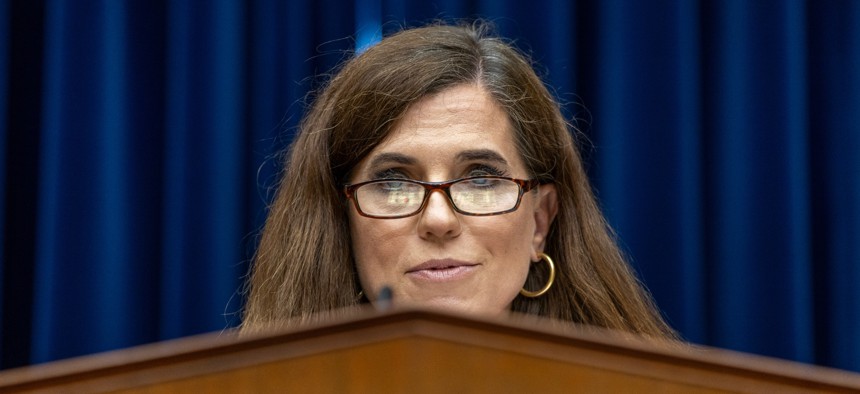
House Cybersecurity, Information Technology and Government Innovation Subcommittee Chairwoman Nancy Mace, R-S.C., wants to know why defense officials canceled a $374 million IT modernization contract. Tasos Katopodis / Getty Images
Pentagon’s reversal on new travel expense system is “troubling,” key lawmaker says
Rep. Nancy Mace, R-S.C., said the Pentagon’s decision to terminate a multi-million dollar contract to replace its Defense Travel System “raises broader questions about DOD’s ability to manage its finances and information technology.”
The Pentagon’s “sudden cancellation” of a contract to modernize its travel management system is drawing questions from the chairwoman of a key House panel, who said the Defense Department’s decision to move back to its troubled legacy software raises broader concerns about how the agency manages its information technology systems.
In a June 30 letter, Rep. Nancy Mace, R-S.C. — who chairs the House Oversight and Accountability Subcommittee on Cybersecurity, Information Technology and Government Innovation — asked Under Secretary of Defense for Personnel and Readiness Gil Cisneros to explain why DOD terminated a $374 million contract “aimed at replacing its archaic, quarter-century-old Defense Travel System with MyTravel, a subscription-based, software-as-a-service system.”
The Pentagon uses the Defense Travel System — or DTS — to manage travel expenses and reimbursements for service members and citizen employees, including for booking flights, reserving rental cars and authorizing travel vouchers.
The system’s design and usability have been criticized by DOD personnel, and a 2019 Government Accountability Office report also found that DTS “processed over $965 million in improper payments” in fiscal years 2016 through 2018.
The Pentagon ordered all of its service branches to switch from DTS to the new MyTravel system last October, but Cisneros issued a May 24 memo rescinding that directive and instructing personnel “to use DTS for all new travel that ends after July 13, 2023.”
Mace called the Pentagon’s reversal on MyTravel “troubling,” adding that the system was developed “over four years at a direct cost of more than $20 million” and that its termination “raises broader questions about DOD’s ability to manage its finances and information technology.”
Pentagon officials who briefed lawmakers last month “indicated the primary reason the contract was terminated was that DOD components are unprepared to implement MyTravel,” according to Mace’s letter, but she noted that officials also said the projected departmentwide use of the new system “would be too low to justify the cost DOD would be obligated to pay.”
A Defense official told Nextgov/FCW that the contract was canceled because “the volume of travel that was originally needed is no longer there,” and the department decided it did not need to proceed with the modernization effort.
In separate letters, Mace also invited Cisneros and Elizabeth Field — GAO’s director of defense capabilities and management — to testify before her panel on July 18 to discuss MyTravel’s termination and her concerns about the Pentagon’s ability to manage its IT systems.







